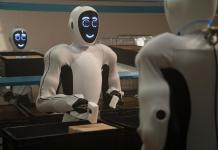Covariant Announces RFM-1: A Robotics Foundation Model for Warehouse Manipulation
Covariant Unveils RFM-1: A Breakthrough in Robotics Foundation Models
When IEEE Spectrum first wrote about Covariant in 2020, it was a new-ish robotics startup with big ambitions in warehouse automation. Fast forward to today, and Covariant is making waves with the announcement of RFM-1, a groundbreaking robotics foundation model that promises to revolutionize the industry.
RFM-1 is described as giving robots the “human-like ability to reason,” a bold claim that is backed up by the impressive capabilities of the model. With 8 billion parameters, RFM-1 is trained on a massive amount of real-world manipulation data collected over the last four years. This data allows the model to excel at warehouse manipulation tasks, such as picking and placing items with speed and precision.
But what sets RFM-1 apart is its potential for expansion. By feeding the model more data, Covariant can train it to perform a wide range of tasks across different environments and with various robots. This scalability is key to Covariant’s vision of powering billions of robots worldwide with their foundation models.
One of the most exciting aspects of RFM-1 is its ability to generalize within the domain of its training data. This means that the model can adapt to new situations and objects without the need for retraining, making it incredibly versatile and efficient. Covariant’s approach to data collection, through its fleet of warehouse robots, sets it apart from other projects like RT-X, allowing them to gather millions of trajectories every few weeks.
RFM-1 operates as a prediction engine for suction-based object manipulation in warehouse settings, incorporating a wide range of data inputs to make accurate predictions. The model can simulate complex scenarios, such as objects on conveyor belts, with impressive accuracy, thanks to its learned physics engine.
Looking ahead, Covariant plans to expand RFM-1’s capabilities by ingesting more data from a variety of robots and tasks. This data ingestion engine will enable the model to power a wide range of robots in different scenarios, making it a valuable tool for companies looking to deploy autonomous robots in production environments.
Overall, Covariant’s RFM-1 represents a significant step forward in the field of robotics foundation models. With its ability to reason, generalize, and simulate complex scenarios, RFM-1 has the potential to revolutionize the way robots are trained and deployed in the real world. As Covariant continues to push the boundaries of AI and robotics, the future looks bright for the company and the industry as a whole.
















